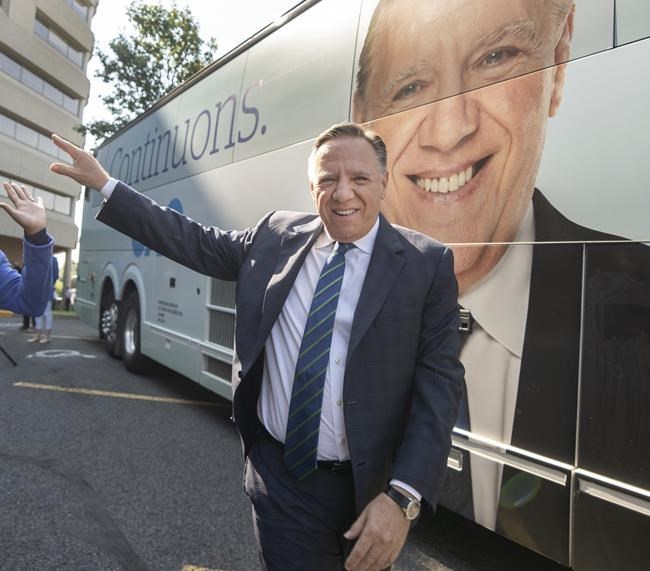Quebec's capital should become the province's "second metropolis" after Montreal, Coalition Avenir Québec Leader François Legault said Friday, promising to boost Quebec City's population with more immigrants.
Legault was campaigning in the Quebec City area — where the CAQ held 12 of 14 seats before the legislature was dissolved and where the party is being challenged by the Conservatives, who were not a factor in the last election but who are now polling second in the region.
"What do we really have to do so that greater Quebec City truly becomes a second metropolis in Quebec? The first thing that has to happen is increasing the population," Legault said.
His plan to encourage newcomers to settle outside Montreal is to expand a program that selects immigrants based on the needs of specific businesses. A prospective immigrant who is offered a job by a company in Quebec City, for instance, would be prioritized over other applicants.
"Automatically, that will increase the percentage of immigrants who go outside of Montreal and we will pay special attention to the greater Quebec (City) region," he said.
Legault made other promises on Friday to keep voters from being wooed to the Conservatives, including a pledge to rebuild a historic market in Quebec City, and other projects worth $450 million.
He also committed to helping finance the city's tramway project — for which construction hasn't started — despite its rising costs, but he didn't say how much the CAQ would be willing to invest, if re-elected.
The tramway, however, is strongly opposed by the Conservatives, who argue it is not sufficiently supported by residents and would be a blight on the urban landscape. Conservative Party of Quebec Leader Éric Duhaime has stated that a vote for his party is a vote against the tramway.
As well, Legault reiterated his support for building a tunnel linking both shores of the St. Lawrence River, but he also suggested that depending on the results of feasibility studies, the tunnel could be a bridge — something championed by Duhaime's party. Shortly after the news conference, Legault's spokesman Ewan Sauves said in a post on Twitter that a tunnel, in fact, would be built if the CAQ is re-elected.
Later in the day, Duhaime jumped on Legault's comments, saying that he didn't know if the premier's statement was a gaffe or whether the CAQ's plans for the transport link between Quebec City and Lévis, Que., were changing. Duhaime demanded once again for government-mandated studies on the tunnel project to be released before Quebecers go to the polls Oct. 3.
"Why is he hiding this?" Duhaime said to reporters during a campaign stop west of Quebec City. "Is it because the studies are bad for Mr. Legault's tunnel project?"
Duhaime made the comments during a visit to a Ford dealership, where he promised that if his party is elected, it would remove the Quebec sales tax on used items, like cars. Doing so, he said, would benefit the environment because it would encourage people to buy used goods.
Meanwhile, Quebec Liberal Leader Dominique Anglade visited the Montreal-area Vaudreuil riding on Friday, which the Liberals won in 2018 but which polls suggest is being seriously threatened by the CAQ. She announced her party would spend $6.6 billion to add 2,000 new hospital beds across the province.
In Trois-Rivières, Que., Québec solidaire spokesman Gabriel Nadeau-Dubois released his party's costed platform. If elected, the party would spend an additional $7.95 billion in its first year, paid for through increased taxes on large businesses and on those who earn more than $100,000 a year, along with a wealth tax on net assets worth over $1 million. Québec solidaire would cut taxes, however, for those who make less than $50,000.
"For Quebec's middle class, what's our fiscal framework? It's a bit less income tax, lower transit fares, lower dental costs, lower school fees from kindergarten to university, less (sales tax). For the middle class, Québec solidaire's fiscal framework is less expensive bills," Nadeau-Dubois said.
Parti Québécois Leader Paul St-Pierre Plamondon said in Montreal that if he's elected, his party would spend an additional $2.3 billion over four years to renovate schools.
This report by The Canadian Press was first published Sept. 9, 2022.
— By Jacob Serebrin in Montreal, with files from Frédéric Lacroix-Couture and Stéphane Rolland.
The Canadian Press



